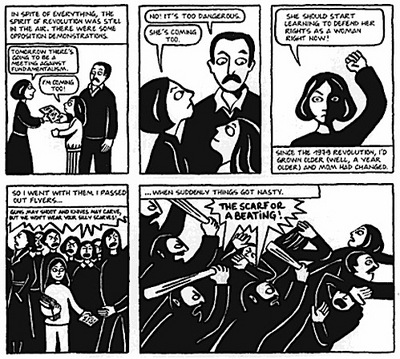These days when you mention Iran, we think of a nation on the brink of war. Extremist images come to mind, full of concealed women and bearded militants. Such stereotypes are useful in the drum up to war. But rarely do we step back to remember when Iran was as European as Europe, or that an autocracy does not necessarily reflect its people. We’ve forgotten how hundreds of thousands of Iranians risked their lives for the Green Revolution, long before the Arab Spring. There’s more to Iran than Ayatollahs and Nuclear Weapons.
Iranian Cinema has always been one of the world’s best, reflecting the country’s incredible artistic heritage. This year saw Asghar Farhadi’s A Separation take the much deserved Best Foreign Picture Oscar. Farhadi himself reminded us not to forget his people’s shared humanity.
Though it has produced many noteworthy films throughout the years, rarely has any given such a fuller contemporary picture of Iran as Persepolis, written and directed by Vincent Paronnaud and Marjane Satrapi. For anyone who wants to learn more about Iran, this is a good place to start.
The film is based on Marjane Satrapi’s autobiographical graphic novel of the same name (below). And as with her book, Satrapi does all the illustrations, detailing her life’s recollections in three acts: Her childhood in Iran; her adolescence upon fleeing to Vienna, Austria; and her adulthood after her return.
She presents her early youth fondly; with much esteem given to her guardians. We see how Marjane takes her elder’s teachings close to heart, primarily from her parents, her uncle Anouche, and especially her grandmother, played by Danielle Darrieux in an unforgettable role of force and joie de vivre. From them we learn about the Shah of Iran, Western Intervention, Government prosecution, and Iran-Iraq War. In these illuminating sequences, we gain a revealing Iranian perspective.
But her time with them is not solely a history lesson. It also plays out as a charming and intriguing coming-of-age tale, where we see a very young Marjane try and make sense of upheavals going on around her. We empathize in the discovery of her small joys and feel deeply for her traumas.
Later on in Vienna, we see her struggle with her adolescence, compounded her feelings of isolation, and guilt. We see her cope with culture shock, of first loves, and first breakups. We see her deal with bigotry and experience the depths of her lowest of lows. Yet through all these teenage trials, the film subtly underlines Marjane’s quiet strength and her will to survive. Sometimes stark and sometimes with delight.
It’s not just Marjane’s story that compels us, but also the manner in which she presents it. Though many still feel the is a genre specifically for children, animation has the intrinsic power to distill emotions; to simplify a mood or feeling and make it potent. As an animator, Satrapi conveys through simple and flat images, a somber whimsy that generates more emotional truth than most CGI spectacles. It’s a work so effective, so effortless, so full of grace and poignancy.
The film also reflects, now more than ever, the timelessness of man’s struggle for dignity. How can anyone see these scenes without thinking of the people who sacrificed so much to merely have a say in their nation’s future?
But above all else, this movie maintains its strong Iranian identity. Because after all, that’s what it’s about. In its third act of adulthood, it focuses on what it mean to be Iranian, by asking the difficult questions Marjane must undoubtedly face. Should she stay behind and show her love of country at the cost of fulfilling the best she can be? Should she be hopeful for Iran when all seems lost, for herself and everyone dear to her? Marjane’s grandmother serves as her anchor and her answer.
For those who love Iran deeply, the title says it all. Once the capital of the Persian Empire, its glory has faded away. Persepolis, with a persevering devotion, longs for better times and a return to the world. It remains alit, shining a light on this little known corner of the globe, and reveals it to be full of humanity and hope.
Michael Mirasol is a Filipino film critic residing in Australia.











